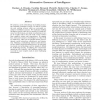Free Online Productivity Tools
i2Speak
i2Symbol
i2OCR
iTex2Img
iWeb2Print
iWeb2Shot
i2Type
iPdf2Split
iPdf2Merge
i2Bopomofo
i2Arabic
i2Style
i2Image
i2PDF
iLatex2Rtf
Sci2ools
128
click to vote
AAAI
1998
1998
Alternative Essences of Intelligence
We present a novel methodology for building humanlike artificially intelligent systems. We take as a model the only existing systems which are universally accepted as intelligent: humans. We emphasize building intelligent systems which are not masters of a single domain, but, like humans, are adept at performing a variety of complex tasks in the real world. Using evidence from cognitive science and neuroscience, we suggest four alternative essences of intelligence to those held by classical AI. These are the parallel themes of development, social interaction, embodiment, and integration. Following a methodology based on these themes, we have built a physical humanoid robot. In this paper we present our methodology and the insights it affords for facilitating learning, simplifying the computation underlying rich behavior, and building systems that can scale to more complex tasks in more challenging environments.
Related Content
| Added | 01 Nov 2010 |
| Updated | 01 Nov 2010 |
| Type | Conference |
| Year | 1998 |
| Where | AAAI |
| Authors | Rodney A. Brooks, Cynthia Breazeal, Robert Irie, Charles C. Kemp, Matthew Marjanovic, Brian Scassellati, Matthew M. Williamson |
Comments (0)

